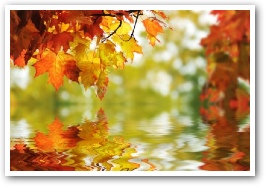What the Blind Man Wanted to See
- C.S. LEWIS
What more, you may ask, do we want?
 |
Ah, but we want so much more — something the books on aesthetics take little notice of. But the poets and the mythologies know all about it. We do not want merely to see beauty, though, God knows, even that is bounty enough. We want something else which can hardly be put into words — to be united with the beauty we see, to pass into it, to receive it into ourselves, to bathe in it, to become part of it.
That is why we have peopled air and earth and water with gods and goddesses and nymphs and elves — that, though we cannot, yet these projections can, enjoy in themselves that beauty, grace, and power of which Nature is the image. That is why the poets tell us such lovely falsehoods. They talk as if the west wind could really sweep into a human soul; but it can't. They tell us that "beauty born of murmuring sound" will pass into a human face; but it won't. Or not yet. For if we take the imagery of Scripture seriously, if we believe that God will one day give us the Morning Star and cause us to put on the splendor of the sun, then we may surmise that both the ancient myths and the modem poetry, so false as history, may be very near the truth as prophecy.
At present we are on the outside of the world, the wrong side of the door. We discern the freshness and purity of morning, but they do not make us fresh and pure. We cannot mingle with the splendors we see. But all the leaves of the New Testament are rustling with the rumor that it will not always be so. Some day, God willing, we shall get in. When human souls have become as perfect in voluntary obedience as the inanimate creation is in its lifeless obedience, then they will put on its glory, or rather that greater glory of which nature is only the first sketch. For you must not think that I am putting forward any heathen fancy of being absorbed into Nature. Nature is mortal; we shall outlive her. When all the suns and nebulae have passed away, each one of you will still be alive. Nature is only the image, the symbol; but it is the symbol Scripture invites me to use. We are summoned to pass in through Nature, beyond her, into that splendor which she fitfully reflects.
 This is Meaghen Gonzalez, Editor of CERC. I hope you appreciated this piece. We curate these articles especially for believers like you.
This is Meaghen Gonzalez, Editor of CERC. I hope you appreciated this piece. We curate these articles especially for believers like you.
Please show your appreciation by making a $3 donation. CERC is entirely reader supported.

Acknowledgement
C.S. Lewis. "What the Blind Man Wanted to See." excerpt from The Weight of Glory and Other Addresses (Grand Rapids, MI, The Macmillian Company, 1949).
This excerpt appeared in Magnificat in November, 2013.
![]()
The Author

 Clive Staples Lewis (1898-1963), commonly called C. S. Lewis was a novelist, poet, academic, medievalist, literary critic, essayist, lay theologian, and Christian apologist. Born in Belfast, Ireland, he held academic positions at both Oxford University (Magdalen College), 1925-1954, and Cambridge University (Magdalene College), 1954-1963. He is best known both for his fictional work, especially The Screwtape Letters, The Chronicles of Narnia, and The Space Trilogy, and for his non-fiction Christian apologetics, such as Surprised by Joy: The Shape of My Early Life, Mere Christianity, Miracles, The Weight of Glory, and The Problem of Pain.
Clive Staples Lewis (1898-1963), commonly called C. S. Lewis was a novelist, poet, academic, medievalist, literary critic, essayist, lay theologian, and Christian apologist. Born in Belfast, Ireland, he held academic positions at both Oxford University (Magdalen College), 1925-1954, and Cambridge University (Magdalene College), 1954-1963. He is best known both for his fictional work, especially The Screwtape Letters, The Chronicles of Narnia, and The Space Trilogy, and for his non-fiction Christian apologetics, such as Surprised by Joy: The Shape of My Early Life, Mere Christianity, Miracles, The Weight of Glory, and The Problem of Pain.




